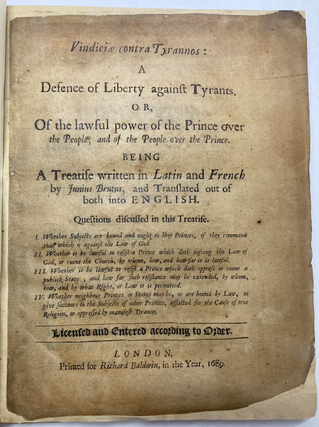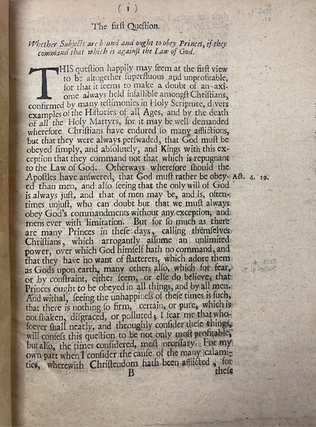VINDICIAE CONTRA TYRANNOS: A Defence of Liberty Against Tyrants, OR, Of the lawful power of the Prince over the People, and of the People over the Prince. BEING A Treatise written in Latin and French by Junius Brutus, and Translated out of both into ENGLISH.
Richard Baldwin, 1689. Leather. [4], 164 pp. Complete. Small 4to. Rebound in marbled paper over boards, backed in vellum with gilt lettering and ruling. Deckled fore and tail edges, head trimmed. A1, A2, Y1, & Y2 (four outer pages) repaired and reinserted. A political-theological treatise centered around four questions, namely: 'I. Whether subjects are bound and ought to obey princes, if they command that which is against the Law of God. II. Whether it be lawful to resist a prince which doth infring the Law of God, or ruine the Church, ... III. Whether it be lawful to resist a prince which doth oppress or ruine a publick state, and how far such resistance may be extended, ... IV. Whether neighbour princes or states may be, or are bound by law, to give succours to the subjects of other princes, afflicted for the cause of true religion, or oppressed by manifest tyranny. Licensed and entered according to order.'. VERY GOOD. Item #1716
A Huguenot tract composed in 1579 as a response to the St. Bartholomew's day massacre, this plainly written piece of political theology has been a central work of the radical canon ever since. It was rapidly translated and carried into many countries by reformed protestant exiles. Publisher Richard Baldwin, no stranger to printing radical and seditious material, took advantage of an opportunity saw a timely opportunity to reprint what would become a perennial open letter to the oppressed and their oppressors. Some 40,000 Huguenot refugees poured into London following the revocation of the Edict of Nantes in 1685. Three years later, the Glorious Revolution gave a ready readership for material grounding a limited monarchy and the mutual sovereignty of People and Prince in theological and scriptural traditions. Not to mention the Civil War just twenty some odd years hence and still quite stewed-upon. Much of the appeal of the Vindicae lies in its simple forthright declaration of the absurdity of the divine right of kings. The central thesis––that a people has a divine right to establish just government where a monarch has failed––is copiously illustrated with appeals to precedent of Scripture as well as common sense.
ESTC R14213. OCLC lists 7 copies.




